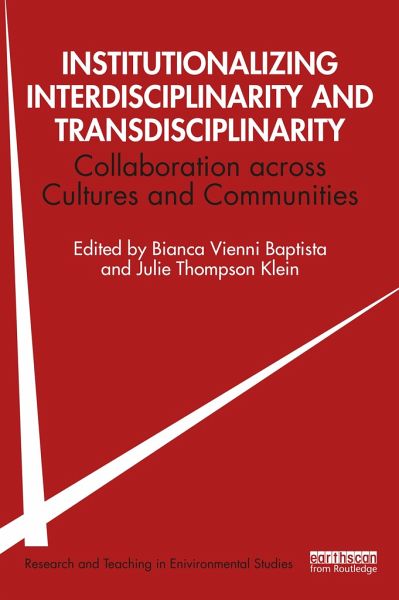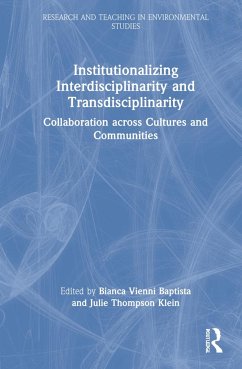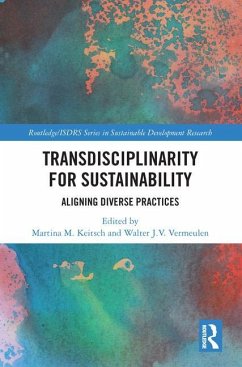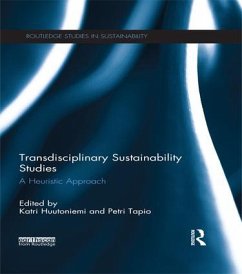
Institutionalizing Interdisciplinarity and Transdisciplinarity
Collaboration across Cultures and Communities
Herausgegeben: Vienni-Baptista, Bianca; Thompson Klein, Julie
Versandkostenfrei!
Versandfertig in 6-10 Tagen
41,99 €
inkl. MwSt.

PAYBACK Punkte
21 °P sammeln!
Institutionalizing Interdisciplinarity and Transdisciplinarity fills a gap in the current literature by systematizing and comparing a wide international scope of case studies illustrating varied ways of institutionalizing theory and practice.This collection comprises three parts. After an introduction of overall themes, Part I presents case studies on institutionalizing. Part II focuses on transdisciplinary examples, while Part III includes cross-cutting themes, such as funding, evaluation, and intersections between epistemic cultures. With expert contributions from authors representing projec...
Institutionalizing Interdisciplinarity and Transdisciplinarity fills a gap in the current literature by systematizing and comparing a wide international scope of case studies illustrating varied ways of institutionalizing theory and practice.
This collection comprises three parts. After an introduction of overall themes, Part I presents case studies on institutionalizing. Part II focuses on transdisciplinary examples, while Part III includes cross-cutting themes, such as funding, evaluation, and intersections between epistemic cultures. With expert contributions from authors representing projects and programs in Asia, Africa, Australia, Europe, Russia and South Caucuses, Latin and North America, this book brings together comparative perspectives on theory and practice, while also describing strategies and models of change. Each chapter identifies dimensions inherent in fostering effective and sustainable practices. Together they advance both analysis and action-related challenges. The proposed conceptual framework that emerges supports innovative practices that are alternatives to dominant academic cultures and approaches in pertinent disciplines, fields, professionals, and members of government, industry, and communities.
Applying a comparative perspective throughout, the contributors reflect on aspects of institutionalizing interdisciplinarity and transdisciplinarity as well as insights applicable to further contexts. This innovative volume will be of great interest to students, scholars, practitioners, and members of organizations promoting and facilitating interdisciplinary and transdisciplinary research.
This collection comprises three parts. After an introduction of overall themes, Part I presents case studies on institutionalizing. Part II focuses on transdisciplinary examples, while Part III includes cross-cutting themes, such as funding, evaluation, and intersections between epistemic cultures. With expert contributions from authors representing projects and programs in Asia, Africa, Australia, Europe, Russia and South Caucuses, Latin and North America, this book brings together comparative perspectives on theory and practice, while also describing strategies and models of change. Each chapter identifies dimensions inherent in fostering effective and sustainable practices. Together they advance both analysis and action-related challenges. The proposed conceptual framework that emerges supports innovative practices that are alternatives to dominant academic cultures and approaches in pertinent disciplines, fields, professionals, and members of government, industry, and communities.
Applying a comparative perspective throughout, the contributors reflect on aspects of institutionalizing interdisciplinarity and transdisciplinarity as well as insights applicable to further contexts. This innovative volume will be of great interest to students, scholars, practitioners, and members of organizations promoting and facilitating interdisciplinary and transdisciplinary research.














